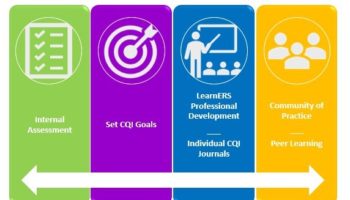Kelli Harris
The Branagh Information Group, in partnership with the authors of the Environment Rating Scales (ERS), are in the process of developing LearnERS, an online Continuous Quality Improvement (CQI) tool for early childhood educators and program administrators to help them understand the “whys” behind quality practice. LearnERS reflects current research and best practices and is designed to support Teachers, Program Directors, Coaches and Technical Assistance Specialists, and QRIS staff in their quality improvement work. It includes self-paced online learning modules, an individualized CQI journal for each learner, peer learning team activities and a professional resource library.
Among the many benefits LearnERS offers are:
- a strengthened understanding of best practice as considered by the ERS,
- guided self-reflection for teachers on current classroom practices,
- empowering programs to improve their quality based on their own CQI goals and identifying shared opportunities for growth within an individual program.
LearnERS also provides a virtual coach to help users set and meet their goals. Currently, 36 preschool focused modules are being finalized and work on infant/toddler focused modules is well underway.
After attending the ERS conference this past October in San Diego, I was given access to one of the modules (Nature/Science) to review. Each module has two phases: Peer Learning Teams and Networking as a Team of Professionals. The Nature/Science module was broken down into five easy-to-read, user friendly chapters with picture examples and some portions have a listening component. The five parts are: Introduction, Materials, Accessibility, The Role of Staff, and Putting It All Together.
The Introduction chapter includes a review of the goal of nature/science in early childhood programs, discusses child development and research on best practice, why nature/science matters in programs, and areas of the module’s focus.
Chapter 2 defines an interest center and why it is valuable to have one in a program. It clearly defines nature/science categories, as well as offers specific examples of each category. Picture examples are also provided. Pictures and tips from the module can often be saved to your CQI Journal. There is guidance for staff in how to provide authentic experiences for the children and offers guiding questions to help create rich learning experiences in the classroom.
Chapter 3 defines accessibility as it pertains to the accessibility of materials to the children. It also reviews barriers to access of materials for children and gives information on providing time for children to have access to the materials.
The Role of Staff (Chapter 4) discusses identifying children’s interests and initiating nature/science activities based on those interests, how staff can promote and build on children’s natural curiosity and offers suggestions of introducing new vocabulary as children’s experiences occur.
Chapter 5, Putting It All Together, reviews key points, recaps why it matters, and helps providers define specific, achievable and realistic goals for their individual program.
Lastly, each chapter has idea sparkers, key points for reviewing each chapter, and many reflective questions for staff and administrators to answer their individual online journal.
It is anticipated that it will take programs approximately 18 months to complete the 36 modules. Each module will range from approximately 1.5 – 5 hours to complete, which allows participants to complete them at their own pace.
The PQA Team is excited to announce that LearnERS will be coming to Pennsylvania in Fall 2019. Stay tuned for new updates regarding this Continuous Quality Improvement tool!
Information obtained from: branaghgroup.com




